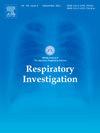Interleukin-32–expressing CD4+ T cells are a potentially pathogenic subset in systemic sclerosis with interstitial lung disease
IF 2.4
Q2 RESPIRATORY SYSTEM
引用次数: 0
Abstract
Background
Systemic sclerosis (SSc) is an autoimmune disease characterized by vasculopathy, fibrosis, and inflammation. CD4+ T cells produce cytokines that are crucial in the pathogenesis of SSc. However, the role of CD4+ T cells in SSc-associated interstitial lung disease (SSc-ILD) remain unclear. Therefore, we aimed to characterize abnormal cytokine production by CD4+ T cell subsets in SSc-ILD.
Methods
We re-analysed publicly available single-cell (sc) RNA-seq datasets (13 SSc and 11 healthy control (HC) lung biopsy samples), bulk RNA-seq (HC peripheral blood (PB)), and microarray datasets from the PB of patients with 18 SSc-ILD and 16 HC) using R, RaNA-seq pipeline, and GEO2R web tool. CD4+ T cells were purified from the PB of HC and analysed.
Results
scRNA-seq data revealed higher IL32 gene expression in CD4+ T cells from SSc lung biopsies compared to those from HC. Microarray data showed significantly higher IL32 gene expression in CD4+ T cells from the PB of patients with SSc-ILD than in HC. IL32 gene expression was elevated in Th1, Th2, and Th17 cells compared with naïve CD4+ T cells, and in central and effector memory CD4+ T cells compared with Tn. Furthermore, scRNA-seq data showed that IL32 gene expression increased in Tn cells without stimulation and in memory CD4+ T cells stimulated with anti-CD3/28 antibodies.
Conclusion
Our results suggest that IL32-expressing CD4+ T cells are a key subset involved in SSc pathologies. IL-32 has both proinflammatory and anti-inflammatory effects on various cells; however, further studies are needed to explore its therapeutic potential.
表达白细胞介素-32的CD4+ T细胞是系统性硬化症合并间质性肺疾病的一个潜在致病亚群
系统性硬化症(SSc)是一种以血管病变、纤维化和炎症为特征的自身免疫性疾病。CD4+ T细胞产生的细胞因子在SSc的发病机制中至关重要。然而,CD4+ T细胞在ssc相关间质性肺疾病(SSc-ILD)中的作用尚不清楚。因此,我们旨在通过CD4+ T细胞亚群表征SSc-ILD中异常细胞因子的产生。方法我们使用R、RaNA-seq管道和GEO2R网络工具重新分析了公开的单细胞(sc) RNA-seq数据集(13例SSc和11例健康对照(HC)肺活检样本)、大量RNA-seq (HC外周血(PB))和来自18例SSc- ild和16例HC患者的PB微阵列数据集。从HC的PB中纯化CD4+ T细胞并进行分析。结果scrna -seq数据显示,与HC相比,SSc肺活检的CD4+ T细胞中IL32基因表达更高。微阵列数据显示,SSc-ILD患者外周血CD4+ T细胞中IL32基因表达明显高于HC。与naïve CD4+ T细胞相比,Th1、Th2和Th17细胞中IL32基因表达升高,中枢和效应记忆CD4+ T细胞中IL32基因表达升高。此外,scRNA-seq数据显示,在未刺激的Tn细胞中IL32基因表达升高,在抗cd3 /28抗体刺激的记忆CD4+ T细胞中IL32基因表达升高。结论表达il32的CD4+ T细胞是参与SSc病理的关键亚群。IL-32对多种细胞具有促炎和抗炎作用;然而,需要进一步的研究来探索其治疗潜力。
本文章由计算机程序翻译,如有差异,请以英文原文为准。
求助全文
约1分钟内获得全文
求助全文

 求助内容:
求助内容: 应助结果提醒方式:
应助结果提醒方式:


